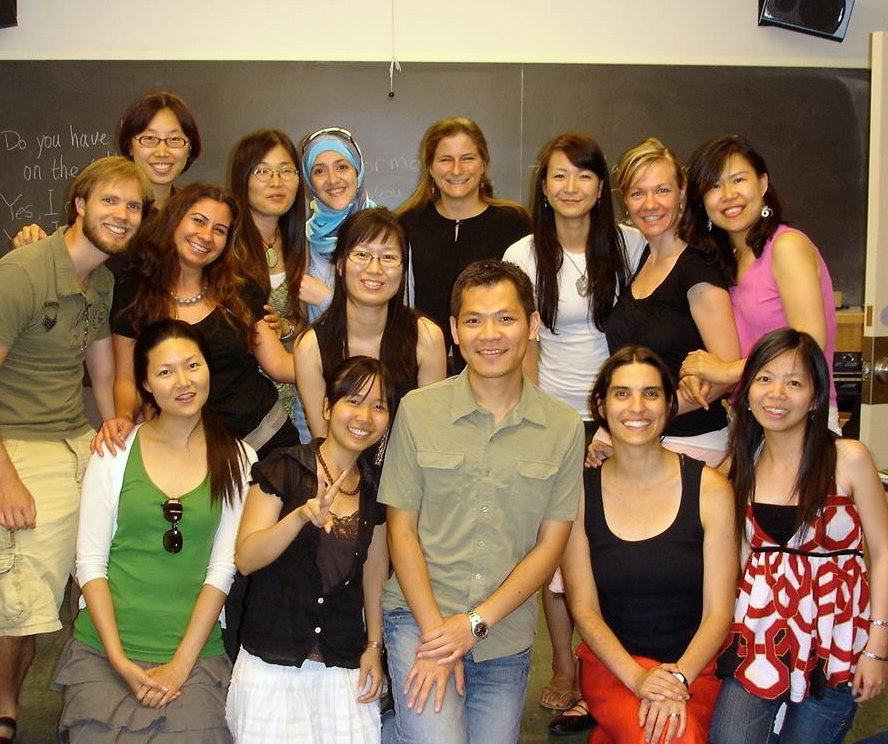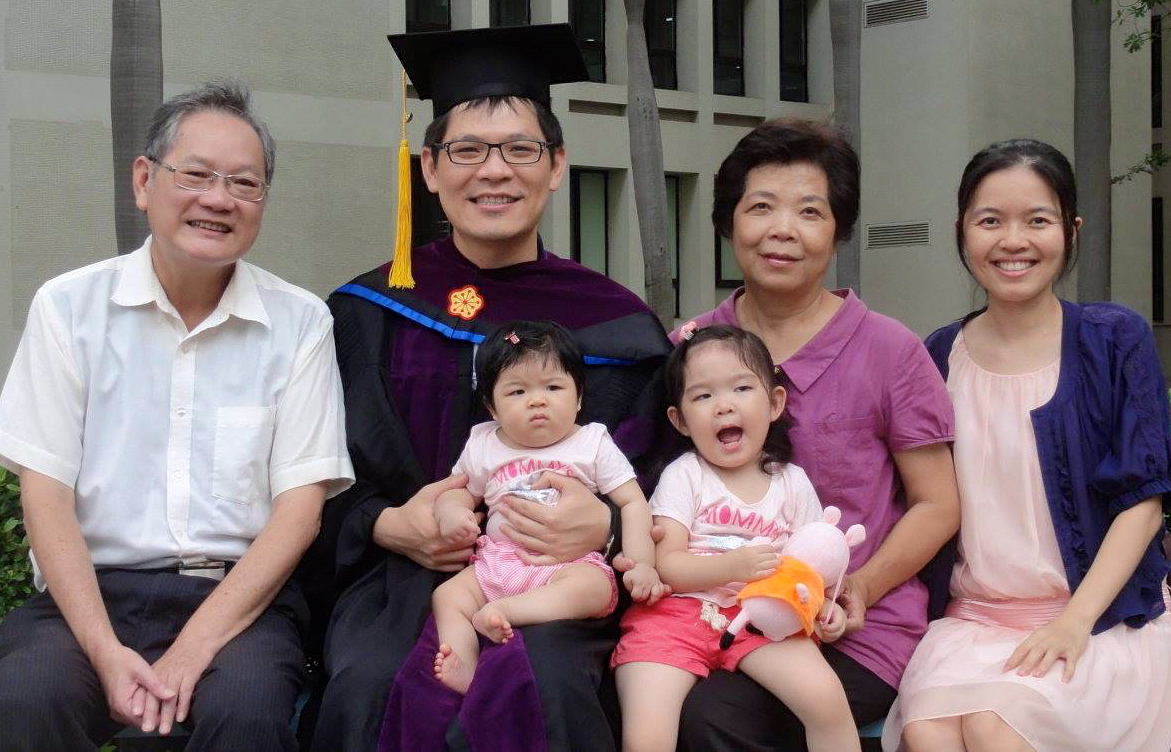Daniel Chen-Mao Wang graduated from the LTS program in 2008. His project was titled “Rethinking the Teaching of Beginning Reading: The Role of Reader’s Theater in the Taiwanese EFL Curriculum”.
Why did you originally decide to study in the US?
Before I applied to the LTS program in 2008, I had been teaching in a public elementary school for a few years with a BA degree in Language and Literature Education in Taiwan. After a few years of mundane teaching that literally drained my inspiration, I started to look for graduate studies to both enrich my teaching career and energize my life of learning as a practicing teacher. The LTS program at the UO stood out as one of few programs that catered to my needs. The quarterly system guaranteed me very intensive five-term solid training and studying that my home country could never offer. When I read and compared many graduate programs, few addressed both the pedagogical and theoretical issues at the same time in their plan of graduate studies. While the course titles of many distinguished TESOL programs mostly featured on the theoretical issues, few stressed the pedagogical phase of language learning. With an educational background, I was certain that I wanted to be a practitioner but yet undecided for a theoretical route. Therefore, the LTS program gave me greater flexibility to take the courses I was interested in as a language trainer. Meanwhile, as LTS was in a Linguistics Department, this enabled me to associate with PhD students and participate in Professor Susan Guion Anderson’s advanced second language acquisition class. Although the LTS program was not fully research-based, the practical but research-oriented program design laid the groundwork for later research-based projects and presented me with opportunities to observe, learn, and experience a “scaffolded, elicited, and formative” language learning class. This helped me a great deal in my current job as an EFL elementary school teacher and adjunct assistant professor at the National Kaohsiung Normal University.
Where and what are you teaching now?
Less than half a year after graduating from the UO, I began the journey of being a full-time teacher and doctoral student at National Kaohsiung Normal University. I was fortunate enough to establish all the ground work at the UO with LTS and LING, and this experience has made me who I am now. My doctoral dissertation, titled “Effectiveness of a Reader’s Theater Project on English Silent Reading and Prosodic Reading Performance of Sixth-graders in Southern Taiwan”, took root in the framework of the project I did in the LTS program and used the phonetic analysis tool, Praat, that Dr. Pashby introduced in her pronunciation class.
Currently, with a PhD in TESOL, I also work with Taiwanese local college students teaching them Freshman English. The days nourished by the LTS program become the nutrients. The LTS program gave students the open space to develop and experiment with their teaching ideas, innovative or extended. In addition, the cohort format made us learn from each other, brainstorm many great ideas, and work all angles to possibly solve the issues language teachers faced on a day-to-day basis. Serving as a teacher of college students, I now still go back to my graduate assignment work to seek inspiration and I still keep in mind the very lesson that LTS taught me so well—analyzing students’ learning needs. Without the nourishment of LTS, I cannot imagine being the person I am now.
What do you enjoy most about your work?
I enjoy the pleasure of teaching because I like to associate with people and especially with students. Many people regarded teaching jobs as repetitious and laborious, while I appreciate the beauty of individual difference and students’ willingness to learn and improve. Last year, I had classes with first-graders up to college freshmen. They were a huge range in population, but I experience the fun and joy to see the spark in their eyes when they find language learning interesting and are willing to go the extra mile to learn with the teacher. As a language teacher, I can always practice what I believe, and experiment with all kinds of variables to motivate my students and enhance their proficiency in English as a global language.
Looking back, what do you think was most valuable about your time in Oregon and LTS?
Three things stick to my mind during the days I was in Oregon: a) the live language teaching observations, b) the freedom to choose interesting courses from other departments, and c) the supportive learning and advising atmosphere.
To begin with, I benefited so much by writing observation journals about many language teaching classes. Given the privilege to sit in class and observe what the teacher did, I witnessed how language teachers deal with the teaching issues with students at different language levels and with different language backgrounds. I ended up observing very diverse types of language classes: Howard Elementary School’s reading class, a South Eugene High School’s English literature class, and a college-level CFL (Chinese as a Foreign Language) class. It was as good as I could wish for—to see what is demonstrated in a real class—more effective than any workshop or lecture could have been.
Secondly, I adored being given a few flexible time slots to take courses from other departments. I remembered that I attended a pedagogical grammar class, a culture diversity class, and a statistics class offered by the School of Education. Those classes required me to interact with the native speaking college students on education-related issues and develop educational professionalism. This experience enriched my career path and helped me become not only a professional “language teacher” but also a professional “educator”.
Lastly, the supportive learning environment in UO and LTS has made this adventure rewarding and worth admiring. Looking back, I enjoyed the time to work with the international cohort and hang out with each other outside the campus. The combination of students in LTS was like no other on campus. It was made up of experienced teachers, students with language learning interests, and ESL teacher wanna-bes, NNS or NS alike. Because of this mix, a lot of negotiation was involved. You needed to pay attention to listen, mentally process, comprehend, clarify, and then react to others in the classes because they were from all different backgrounds. Each person interpreted things in a different way. To be participatory, you had to put yourself into their shoes, consider from their perspectives to understand what they were trying to express, and then provide your own opinions. But the beautiful thing was: the more positively you interacted with one another, the better and closer relationship you built with your cohort. We felt like a family in this foreign country and the camaraderie support brought us together. A similar positive atmosphere was also between the teachers and the students. I always valued, although scared to death at that moment, the advisory office hours with each faculty member. The teachers did feel distant and authoritative; they were actually very helpful and considerate. They offered academic advice, helped clarify some thoughts on studies, suggested directions to do a term paper, etc. I talked to most of the teachers privately in office hours and I guaranteed what I say is true. The friendliness and thoughtfulness was not something you could only find in your imagination. It was genuinely felt.
What advice would you give to current or future LTS students?
LTS seems to be a program that is too good to be true. However, you have to keep in mind that this is a five-quarter program. Basically, you will have to squeeze the length and endure the intensity of five semesters into 15 months in order to fulfill all the requirements. Some take longer than 15 months to accomplish it. In order to make the most of your time and enjoy the intensity, my suggestions are:
- Start early to collect research literature that interests you.
- Frequent the library and establish your personal teacher resource library.
- Read the assigned readings and be a productive contributor in classes.
- Take advantage of every opportunity to make friends (or to know more people).
- Experiment with what you believe is feasible in your future language classes and explore it with back up literature.
With all these things to do in fifteen months, this short journey is going to be like a sealed time capsule—it will store valuable and memorable events and keep you rejuvenated every time you look back!


